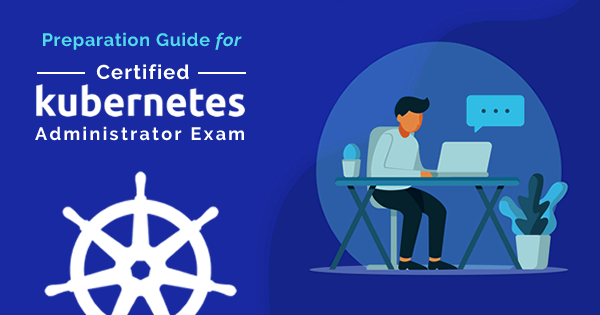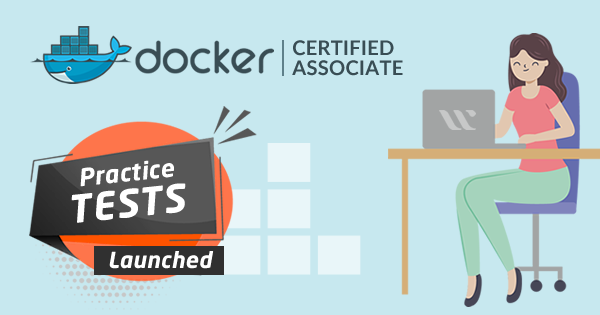Containerized applications have been a groundbreaking intervention in the domain of software development. At the same time, the popularity of container management and orchestration tools such as Kubernetes has also increased substantially. Therefore, you can find many online search queries for certified Kubernetes administrator exam preparation. Kubernetes is the most preferred open source software for deployment, scaling, and management of containerized applications across various sectors.
It serves the functions of scheduling containers on a cluster alongside the management of workloads for ensuring operations as required. Kubernetes also helps in describing the components of applications alongside the interactions between components and their management. As a result, modern software systems find a substantial improvement in ease of operations and portability.
kBased on these aspects, many enterprises are turning towards professionals with expertise in Kubernetes administration and development. Until recently, there was no official certification for Kubernetes. However, now with the Certified Kubernetes Administrator (CKA) exam, you can achieve an official accreditation for your expertise in Kubernetes.
Enroll Now: Certified Kubernetes Administrator Online Course
The following discussion dives further into the details of an ideal CKA exam preparation guide. The important highlights of the discussion would include basic details regarding the exam, such as an overview of the exam and the target audience for the exam. In addition, the discussion would also outline the objectives covered in the exam with an illustration of different subtopics in each objective.
However, the most important part of the following information would be the comprehensive guide for certified Kubernetes administrator exam preparation. Interestingly, the guide would also include the support of recommended best practices and tips from experts and qualified candidates.
Certified Kubernetes Administrator Exam
Before starting the CKA exam preparation, it is essential to know about the exam first. The Certified Kubernetes Administrator (CKA) exam is the brainchild of the Cloud Native Computing Foundation (CNCF), in collaboration with The Linux Foundation.
Google joined hands with The Linux Foundation, back in July 2015, with the release of Kubernetes v1.0, and the CNCF was born. The primary objective of the CNCF is the development of sustainable ecosystems using Kubernetes. The CKA exam is a unique initiative by CNCF for expanding a community of organizations working around a combination of high-quality projects for container orchestration in a microservices architecture.
Certified Kubernetes Administrator exam preparation is ideal for testing your skills for the exam. The CKA certification exam aims at bringing standardization to the Kubernetes ecosystem, and the large-scale adoption of Kubernetes makes the exam a worthy investment.
However, aspiring candidates should know that the exam will not be as easy as they expect. Rather than putting up multiple-choice questions, the exam tests the knowledge of candidates on a practical level. In addition, the exam follows a strict curriculum, thereby implying the need for comprehensive certified Kubernetes administrator training before appearing for the exam.
CKA Exam Overview
The next important point of concern for aspiring candidates in their preparations should be an overview of the CKA exam. The exam overview is the most helpful tool for learning all basic information regarding the exam.
According to the opinions of certain candidates who qualified for the CKA exam, there will be around 24 questions in the exam. Candidates will have to appear for the exam in an online proctored format.
The exam will present multiple performance-based tasks, and candidates will have to solve them on a command line with Kubernetes. Therefore, certified Kubernetes administrator exam preparation should focus on acquaintance with the command line.
Important highlights of the CKA exam information are:
- The total duration of the exam is around 3 hours.
- Based on Kubernetes v1.17, the CKA exam will test your capabilities across different domains.
- The registration fee for the exam is $300 USD.
- The exam is available in three languages, such as English, Japanese, and Simplified Chinese.
Target Audience for the Exam
The target audience for the CKA exam is also an important concern for certified Kubernetes administrator exam preparation. You need to know whether you are the right candidate for the exam or the other way around, whether the exam is right for you or not. The ideal candidates for the CKA exam include any individual who aspires to learn about working with Kubernetes. The certification exam, however, is specifically fit for Kubernetes cluster administrators.
Requirements for the Exam
Candidates should also note that there are no prerequisites for the exam. However, before you start your certified Kubernetes administrator training, you should take note of the recommended knowledge and experience requirements. Here are some of the recommended knowledge requirements that can help you.
- Comprehensive understanding of containers, especially Docker.
- Fluency in working with Linux shells.
- Previous experience in working with virtual machines in cloud environments.
Also Read: Top 10 interesting Kubernetes Facts
Exam Objectives: Domains Covered in the CKA Exam
The preparation of a candidate for the CKA certification exam could improve considerably through a detailed observation of exam objectives. The exam objectives help candidates in driving their preparations in a specific direction. For example, detailed knowledge of the subtopics can help candidates in finding the right learning materials for preparation.
Certified Kubernetes Administrator exam preparation should also focus on the weighting assigned to each exam objective. This can help you recognize the importance of each domain in the exam and prepare accordingly. The CKA certification exam emphasizes on testing skills that are highly required in the case of successful Kubernetes administrators.
A certified Kubernetes administrator study guide outlining all the above-mentioned domains is essential for your preparation. The study guide can help you find the subtopics in each domain covered in the CKA exam. Let us briefly outline the domains along with the subtopics that you will find in each domain of the CKA exam.
Domain 1: Application Lifecycle Management (8%)
- Understanding deployment and performing rolling updates and rollbacks.
- Knowledge of different ways for application configuration.
- Knowledge of scaling applications.
- Understanding the basics needed for developing a self-healing application.
Domain 2: Installation, Configuration, and Validation (12%)
- Designing a Kubernetes Cluster.
- Installation of Kubernetes Masters and Nodes.
- Configuration of secure cluster communications.
- Configuration of a Kubernetes cluster with high availability.
- Knowledge of sources for Kubernetes release binaries.
- Provisioning underlying infrastructure for the deployment of a Kubernetes cluster.
- Selection of a network solution.
- Selection of Kubernetes infrastructure configuration.
- Running end-to-end tests on the cluster.
- Analysis of end-to-end test results.
- Running Node end-to-end tests.
- Installation and use of kubeadm for installation, configuration, and management of Kubernetes clusters.
Domain 3: Core Concepts (9%)
- Understanding of Kubernetes API primitives.
- Understanding of Kubernetes cluster architecture.
- Understanding Services and other network primitives.
Domain 4: Networking (11%)
- Understanding the networking configuration on cluster nodes.
- Understanding Pod networking concepts.
- Understanding Service Networking.
- Deployment and configuration of the network load balancer.
- Knowledge of using Ingress rules.
- Knowledge of configuration and use of cluster DNS.
- Understanding CNI.
Read our previous article to know about top Kubernetes tips and tricks that will make Kubernetes usage easier for you.
Domain 5: Scheduling (5%)
- Use of label selectors for scheduling Pods.
- Understanding the role of DaemonSets.
- Understanding the impact of resource limits on Pod scheduling.
- Understanding the methods for running multiple schedulers and configuring Pods for using them.
- Manual scheduling of a pod without a scheduler.
- Displaying scheduler events.
Domain 6: Security (12%)
- Knowledge of methods for configuring authentication and authorization.
- Understanding Kubernetes security primitives.
- Knowledge of methods to configure network policies.
- Creation and management of TLS certificates for cluster components.
- Working with images with higher safety.
- Definition of security contexts.
- Security of persistent key-value store.
Domain 7: Cluster Maintenance (11%)
- Understanding the Kubernetes cluster upgrade process.
- Facilitating upgrades for operating systems.
- Implementation of backup and restore methodologies.
Domain 8: Logging/Monitoring (5%)
- Understanding the methods for monitoring all cluster components.
- Understanding the methods for monitoring applications.
- Management of cluster component logs.
- Management of application logs.
Domain 9: Storage (7%)
- Understanding of persistent volumes and knowledge of creating them.
- Understanding the access modes for volumes.
- Understanding persistent volume claims basics.
- Understanding Kubernetes storage objects.
- Knowledge of configuring applications with persistent storage.
Domain 10: Troubleshooting (10%)
- Troubleshooting application failure.
- Troubleshooting control plane failure.
- Troubleshooting worker node failure.
- Troubleshooting networking.
Also Read : Which Kubernetes Certification is Right for You?
Benefits of Certified Kubernetes Administrator Certification
Now, you may be wondering about the reasons to put so much effort into certified Kubernetes administrator exam preparation. Well, there are a lot of objectives to cover, and you should know that the certification has some benefits to gain confidence. Here are some of the returns that you could get for your efforts in preparing for certified Kubernetes administrator questions.
- First of all, the CKA certification helps you make your resume unique from the pack. Companies are relying more and more on Kubernetes, thereby giving you a unique opportunity to outperform your competition.
- Top certifications such as CKA bring exceptional promises for a rise in your remuneration. Companies are willing to pay more to certified Kubernetes professionals because the certifications validate the abilities of candidates to address all professional responsibilities effectively.
- Passing the certification exam is a rewarding experience that can contribute to personal growth in the long term.
- Most important of all, going through a comprehensive certified Kubernetes administrator preparation guide for the exam diversifies your knowledge and skills.
Comprehensive Guide to Prepare for Certified Kubernetes Administrator Exam
So, you can clearly note that there are a lot of opportunities with the CKA certification exam. However, you need to ensure proper certified Kubernetes administrator exam preparation to qualify the exam in the first attempt. Here are some of the important steps that can help you prepare for the CKA exam.
-
Review the Exam Guide
The first requirement for your preparations is the certified Kubernetes administrator study guide. You can find the study guide on the official website of CNCF or The Linux Foundation. Take a closer look at subtopics covered in each domain and the weight of each domain. This way, you can know what you’re up against, thereby giving you a competitive edge for your preparations.
-
Training is Mandatory
The next important addition in any certified Kubernetes administrator preparation guide refers to online training courses.
Candidates can access the free “Introduction to Kubernetes” course by The Linux Foundation to understand all key concepts in Kubernetes.
In addition, the course “Fundamentals of Kubernetes” by The Linux Foundation also helps in capitalizing on introductory learning resources to train candidates for requirements of the CKA certification exam.
You can also choose popular training providers such as Whizlabs for certified Kubernetes administrator exam preparation. Candidates can get the assurance of guidance by trustworthy and competent subject matter experts with training courses.
-
Familiarize with the Linux Command Line
Candidates should have to master the Linux Command Line for ensuring that they can master the certified Kubernetes administrator questions. You should practice by using a text editor and remember useful shortcuts. In addition, candidates should also learn about the creation and management of system services.
-
Know the Exam Console Well
It is also important for candidates to become used to the exam console for certified Kubernetes administrator exam preparation. The exam’s terminal will be different than an SSH client or a standalone terminal. Candidates have to know the shortcuts that won’t work in the terminal. Furthermore, candidates should also improve their knowledge of using the Notepad feature as it is not possible to take notes anywhere else during the exam.
-
Trust Practice
The final, yet most reasonable advice to prepare for CKA exam is practice. Always take some time to reflect on what you learn and then implement it in practice. Start with the basics and then move gradually towards the higher levels of a certified Kubernetes administrator preparation guide.
Average Salary of Certified Kubernetes Administrator
The certified Kubernetes administrator salary is also one of the things that you should note for your preparations. The salary estimates can help you anticipate the career promises that the certification brings with it. According to job listings of ZipRecruiter, the national average salary for Kubernetes administrators in the US ranges from $78,000 to $215,500. The exceptional certified Kubernetes administrator salary estimates clearly invite every candidate to invest their 100% in preparations.
Preparing for a Kubernetes interview? Here are the top Kubernetes interview questions with detailed answers that you should read to crack your Kubernetes interview.
Ready to Prepare for the Certified Kubernetes Administration Exam?
So, there are a lot of opportunities to discover in terms of career development with the Certified Kubernetes Administrator exam. If you ensure proper certified Kubernetes administrator exam preparation, then you can be a top MVP for many companies worldwide. However, you need to support your preparations with the right online training courses and practice tests.
Furthermore, you need to take care of your health and diet during your preparations for the exam. One of the most important things that every candidate should note is the need to ward off stress. If you fail in one attempt, then you can always opt for another attempt after thorough preparation. Always trust your instincts and never lose confidence.
Enroll for the Certified Kubernetes Administrator Online Course and start your preparations right now!
- Top 10 Highest Paying Cloud Certifications in 2024 - March 1, 2023
- 12 AWS Certifications – Which One Should I Choose? - February 22, 2023
- 11 Kubernetes Security Best Practices you should follow in 2024 - May 30, 2022
- How to run Kubernetes on AWS – A detailed Guide! - May 30, 2022
- Free questions on CompTIA Network+ (N10-008) Certification Exam - April 13, 2022
- 30 Free Questions on Microsoft Azure AI Fundamentals (AI-900) - March 25, 2022
- How to Integrate Jenkins with GitHub? - March 22, 2022
- How to Create CI/CD Pipeline Inside Jenkins ? - March 22, 2022



